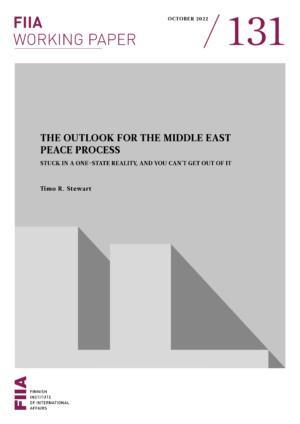Although there is international consensus on the desired outcome of the Middle East Peace Process (MEPP) – namely Israeli-Palestinian talks resulting in a two-state solution – there is no peace, and for years there has been no process either. In the meantime, Israelis still live with the threat of terrorism and rocket attacks, while Palestinians continue living without full rights under what were supposed to be interim arrangements agreed on in the 1990s.
This Working Paper outlines how repeated failures to reach a permanent status agreement, and continuing developments on the ground, leave little hope for a two-state future. At the same time, the current situation is inherently unstable, and will not hold indefinitely.
Without credible movement towards a two-state solution, the ongoing shift in focus to the power dynamics of the current one-state reality and rights-based approaches will continue. Analysts and policymakers also need to prepare for outcomes other than a two-state solution, should the people of Israel-Palestine shift to pursuing them.


